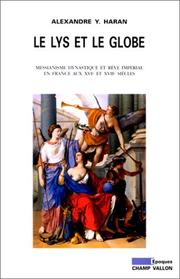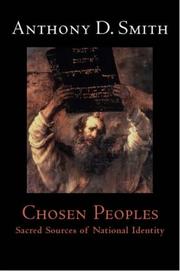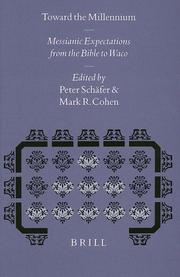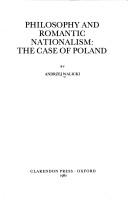| Listing 1 - 5 of 5 |
Sort by
|

ISBN: 2876733005 9782876733008 Year: 2000 Publisher: Seyssel: Champ Vallon,
Abstract | Keywords | Export | Availability | Bookmark
 Loading...
Loading...Choose an application
- Reference Manager
- EndNote
- RefWorks (Direct export to RefWorks)
Political messianism --- Messianisme politique --- History --- Histoire --- France --- Kings and rulers --- Religious aspects --- Rois et souverains --- Aspect religieux --- Messianism, Political --- Religious aspects. --- Messianism, Political - France. --- FRANCE --- MONARCHIE --- HISTOIRE --- POLITIQUE ET GOUVERNEMENT --- 16E-17E SIECLES

ISBN: 0192100173 9780192100177 Year: 2003 Publisher: Oxford Oxford University Press
Abstract | Keywords | Export | Availability | Bookmark
 Loading...
Loading...Choose an application
- Reference Manager
- EndNote
- RefWorks (Direct export to RefWorks)
'Unto thy seed I have given this land.' From the moment of God's covenant with Abraham in the Old Testament, the idea that a people are chosen by God has had a central role in shaping national identity. Chosen Peoples argues powerfully that sacred belief remains central to national identity, even in an increasingly secular, globalized modern world. In this important new study, Anthony D. Smith goes in search of the deep Judeo-Christian roots of the many manifestations of national identity. This rich and timely contribution to current debates about nationalism explains the complex historical reasons behind often violent modern conflicts around issues of land, culture, religion, and politics. Tracing the development of individual nations over many centuries, it offers fascinating insights into the religious and cultural foundations of countries such as Great Britain, the United States, Israel, France, and Germany. The argument draws on a wide range of examples from historic landscapes in Ireland, Switzerland and Egypt, myths of Arthurian Britain, Holy Russia, and Byzantium, through memories of a 'Golden Age', to the modern commemoration of the 'Glorious Dead', and of victims of war.
Covenants --- Election (Theology). --- Messianism, Political. --- Nationalism --- Political messianism. --- Religious aspects. --- Election (Theology) --- Alliances (Religion) --- Election (Théologie) --- Messianisme politique --- Election (Théologie) --- Political messianism --- Messianism, Political --- Messianism --- Nationalism and religion --- Predestination --- Salvation --- Covenants (Religion) --- Religious aspects --- Christianity --- Nationalisme --- Aspect religieux

ISSN: 01698834 ISBN: 9004110372 9004378995 9789004110373 Year: 1998 Volume: 77 Publisher: Leiden: Brill,
Abstract | Keywords | Export | Availability | Bookmark
 Loading...
Loading...Choose an application
- Reference Manager
- EndNote
- RefWorks (Direct export to RefWorks)
This collection of 16 articles represents a selection of the papers delivered in the course of a seminar (1995-1996) at the Institute for Advanced Study in Princeton and its concluding joint symposium held at the Institute and Princeton University. Wide-ranging in scope, the volume covers messianic expectations from biblical times up to modern and contemporaneous adaptations, whereby the focus lies on the messianic concept within Judaism: diversity and variety of messianic expectations in antiquity; messianic movements at the time of the Crusades and around the fifth millennium (1240); the 'Pseudo'-Messiah Sabbatai Avi in the early modern period; the philosophers Hermann Cohen, Franz Rosenzweig and Walter Benjamin with respect to their thinking about messianism as well as the Lubavitch movement. Also included are investigations on pagan Graeco-Roman writings and messianic strands in the medieval and baroque Christian context. The section on the modern period contains contributions dealing with the Ahmaddiyya movement in India, messianic currents in the socio-political culture of the Weimar Republic as well as certain messianic aspects in the very recent so-called Branch Davidian community in Waco, Texas. The broad spectrum of stimulating analyses provides a fresh re-evaluation of an apparently timeless phenomenon.
Messianism --- Jewish messianic movements --- Millennialism --- Messianism, Political --- Messianisme --- Congresses --- Congrès --- Political messianism --- 232.1 --- 296*64 --- 291.61 --- -Messianism --- -Messianism, Political --- -Millennialism --- -Amillennialism --- Chiliasm --- Millenarianism --- Millennianism --- Postmillennialism --- Premillennialism --- Dispensationalism --- Fundamentalism --- Millennium (Eschatology) --- Nationalism --- Religion --- Nativistic movements --- Messianic movements, Jewish --- Jews --- Messiah --- Messianisme. Messias--(algemeen) --- Joods messianisme en apocalyptiek --- Vertegenwoordigers van de godheid: incarnatie; messias; priesters; hiërarchie; theocratie --- Restoration --- Judaism --- -Messianisme. Messias--(algemeen) --- 291.61 Vertegenwoordigers van de godheid: incarnatie; messias; priesters; hiërarchie; theocratie --- 296*64 Joods messianisme en apocalyptiek --- 232.1 Messianisme. Messias--(algemeen) --- -291.61 Vertegenwoordigers van de godheid: incarnatie; messias; priesters; hiërarchie; theocratie --- Amillennialism --- Congresses. --- Congrès --- Messianism - Congresses --- Jewish messianic movements - Congresses --- Millennialism - Congresses --- Political messianism - Congresses --- Jewish messianic movements. --- Messianic era (Judaism)

ISBN: 0198272502 Year: 1982 Publisher: Oxford Clarendon
Abstract | Keywords | Export | Availability | Bookmark
 Loading...
Loading...Choose an application
- Reference Manager
- EndNote
- RefWorks (Direct export to RefWorks)
Messianism, Political --- -Nationalism --- -Philosophy, Polish --- -Romanticism --- -Pseudo-romanticism --- Romanticism in literature --- Aesthetics --- Fiction --- Literary movements --- Polish philosophy --- Consciousness, National --- Identity, National --- National consciousness --- National identity --- International relations --- Patriotism --- Political science --- Autonomy and independence movements --- Internationalism --- Political messianism --- Messianism --- Nationalism --- Poland --- Intellectual life --- Philosophy, Polish --- Romanticism --- -Poland --- -Messianism, Political --- Poyln --- Polska Rzeczpospolita Ludowa --- Polʹsha --- P.N.R. --- P.R.L. --- Pologne --- Polish Commonwealth --- Polonia --- Warsaw (Duchy) --- Polska --- Polsko --- T︠S︡arstvo Polʹskoe --- Królestwo Polskie --- Polʹskai︠a︡ Narodnai︠a︡ Respublika --- PNR --- PRL --- Poljska --- Lehastan --- Polin --- Būlūniyā --- Polonyah --- République populaire de Pologne --- Polen --- Ppolsŭkka --- Polish People's Republic --- Republic of Poland --- Poland (Territory under German occupation, 1939-1945) --- Generalgouvernement (Poland) --- Generalne Gubernatorstwo (Poland) --- General Government (Poland) --- Heneralʹna Hubernii︠a︡ (Poland) --- Rzeczpospolita Polska --- Polish Republic --- Congress Kingdom of Poland --- Congress Poland --- Królestwo Kongresowe Polskie --- Kongresówka --- Kingdom of Poland --- Lahistān --- لهستان
Book
ISBN: 9781107013360 9781139204927 1139204920 1107013364 9781139004022 1139004026 1280484608 9781280484605 9781139206501 1139206508 9781139203524 9781107429482 1107229472 1139199803 9786613579584 1139205714 1139203525 1139202111 110742948X Year: 2012 Publisher: Cambridge: Cambridge university press,
Abstract | Keywords | Export | Availability | Bookmark
 Loading...
Loading...Choose an application
- Reference Manager
- EndNote
- RefWorks (Direct export to RefWorks)
If nationalism is the assertion of legitimacy for a nation and its effectiveness as a political entity, why do many nations emphasize images of their own defeat in understanding their history? Using Israel, Serbia, France, Greece and Ghana as examples, the author argues that this phenomenon exposes the ambivalence that lurks behind the passions nationalism evokes. Symbols of defeat glorify a nation's ancient past, while reenacting the destruction of that past as a necessary step in constructing a functioning modern society. As a result, these symbols often assume a foundational role in national mythology. Threats to such symbols are perceived as threats to the nation itself and consequently are met with desperation difficult for outsiders to understand.
Nationalism --- National characteristics --- Crises --- Memory --- Collective memory --- Political messianism --- History --- Psychological aspects --- Social aspects --- Messianism, Political --- Messianism --- Characteristics, National --- Identity, National --- Images, National --- National identity --- National images --- National psychology --- Psychology, National --- Anthropology --- Social psychology --- Ethnopsychology --- Exceptionalism --- Retention (Psychology) --- Intellect --- Psychology --- Thought and thinking --- Comprehension --- Executive functions (Neuropsychology) --- Mnemonics --- Perseveration (Psychology) --- Reproduction (Psychology) --- Change --- Collective remembrance --- Common memory --- Cultural memory --- Emblematic memory --- Historical memory --- National memory --- Public memory --- Social memory --- Group identity --- History. --- Memory. --- Social Sciences --- Political Science --- Nationalism - History --- National characteristics - Memory --- Crises - Psychological aspects - History --- Memory - Social aspects - History --- Collective memory - History --- Political messianism - History
| Listing 1 - 5 of 5 |
Sort by
|

 Search
Search Feedback
Feedback About UniCat
About UniCat  Help
Help News
News